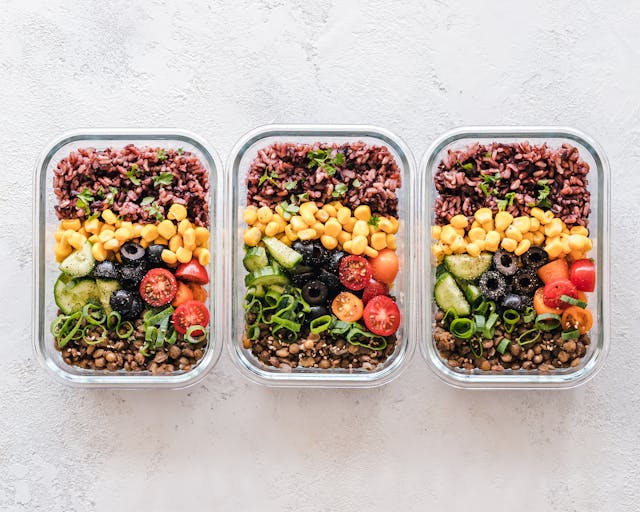
Blog
A Comprehensive Guide On How To Build Lean Muscles

Building muscles by going to the gym and drinking your favorite protein shake won’t seem to be a big deal. However, when it comes to lean muscles specifically, you will need to follow a specific workout plan. So, are you ready to learn how to build lean muscle mass?
The thing is, targeting lean muscles might need a different yet tougher workout routine. It will not only include a change in the choice of your exercises, but also your diet.
Let’s get into the details of how to build lean muscle mass.
Tips to build lean muscle mass
Track your macros

Keeping track of your calorie intake is necessary to control your weight while building muscles.
The best idea here is to look at your individual macros instead of counting calories in your overall diet. This way, you will know how much macros to eat.
If you don’t know how to count your macros, you can use a macro calculator to get better insights. Such calculators help you determine the optimal quantities of protein fat, etc., according to factors like your age and lifestyle.
When you follow a nutritional diet, you’re on the track of fitness.
Eat enough protein

As protein intake is linked with muscle gain, it’s always recommended to include protein in your diet if you want to gain lean muscles.
In general, we need 1.5 to 2 grams of protein powder per kilogram of body weight.
While exercising, you will need to keep this in mind.
As protein is linked with muscle recovery, you can also include a protein shake in your routine to boost the recovery process. Apart from providing energy, protein powders have many benefits.
Consume carbs
Consuming carbs is effective in providing energy for workouts. It’s because carbohydrates are an important energy source during exercise.
You can eat carbs before and after a workout, whatever suits you best.
Eating carbs before a workout will provide enough energy to exercise. Consuming them post-workout, along with protein, will help in muscle repair.
Increase your training frequency
Increasing your training frequency can have a positive impact on your body if you want to build lean muscles.
For example, if you train two times a week, you can increase it to four to five times a week. However, to compensate for this added frequency, you can shorten your training sessions. This strategy will help recover the muscles.
Also, regular training will help increase muscle mass.
Never skip a cardio day

Although people don’t always rely on cardio to gain muscles, it should be a part of your exercise routine if you plan to gain lean muscles.
In fact, some slight cardio will also do the work. However, remember that too much cardio can destroy your gains.
While you can do weight loss exercises, cardio will also help you burn excess calories and increase work capacity.
So, it’s always a good idea to include cardio in your workout routine.
Perform heavy compound exercises

If your focus is to gain muscle mass, you can also move towards heavy compound exercises. These include:
- Squats
- Overhead press
- Deadlifts
- Pullups
However, they are strenuous exercises, and you will need to be careful while performing them. Beginners should not perform strenuous exercises until their body can handle heavy exercises without showing side effects.
Consider lighter weights and higher reps

If you cannot handle too much weight but want to build lean muscle, don’t worry.
There’s another way.
You can keep the weights light and increase the number of reps.
While people believe that increased weight is better to build muscles, some research suggests that lighter weights and higher reps might be a more efficient way to build muscles.
So, don’t worry if you’re stuck to light and moderate weights. If you increase the number of reps, you can get good results.
It’s better to exercise between 5 and 15 reps. If your body allows, you can increase the reps as well. Another option is to alternate the number of reps according to your body. For example, you can exercise in ranges of 5-10, 10-15, 15-20, etc.
Focus on your diet

While building muscles will make you gain weight, you should not gain body fat. That is why it’s important to focus on your fats, carbohydrates, proteins, etc. while eating. A healthy proportion of each of these will provide energy to exercise while also maintaining ideal weight.
Another idea is to stop binging. In most cases, binging can make you gain more weight, especially if you’re consuming unhealthy snacks.
However, for individuals already on the leaner side, it’s good to eat more calories to gain weight. A good option is to start by eating 300-500 calories more. Ideally, you should gain 0.5-1 pound of weight in a week.
While doing all this, make sure you are gaining muscles and not body fat. If you gain more weight in a week than the ideal weight, you should cut back on calories.
While this is a general idea, you should consult a professional for your weight loss/gain plan during this phase.
Train your muscles for a full range of motion

Does the range of motion really matter?
Well, yes.
A study showed that performing exercises with a full range of motion was effective in muscle gain.
So, if you don’t want to extend your workouts or add more weight, you can increase the range of motion.
Take-away message
Building lean muscle mass will come with effort and patience.
However, the key is to work smart and stay consistent in your exercise. You can also work out the smart way.
Remember, exercising too much is not the main goal here. You will also need rest to let your muscles recover.
So, stay on track with your fitness goals by following the right techniques!












